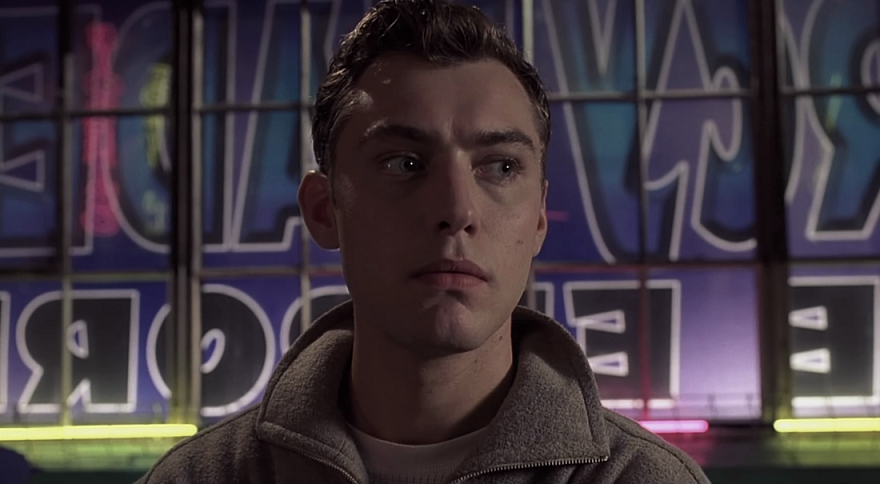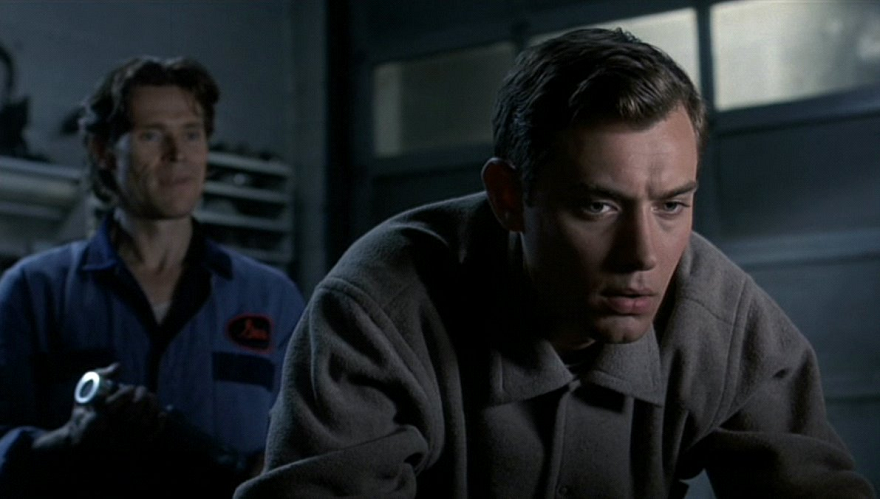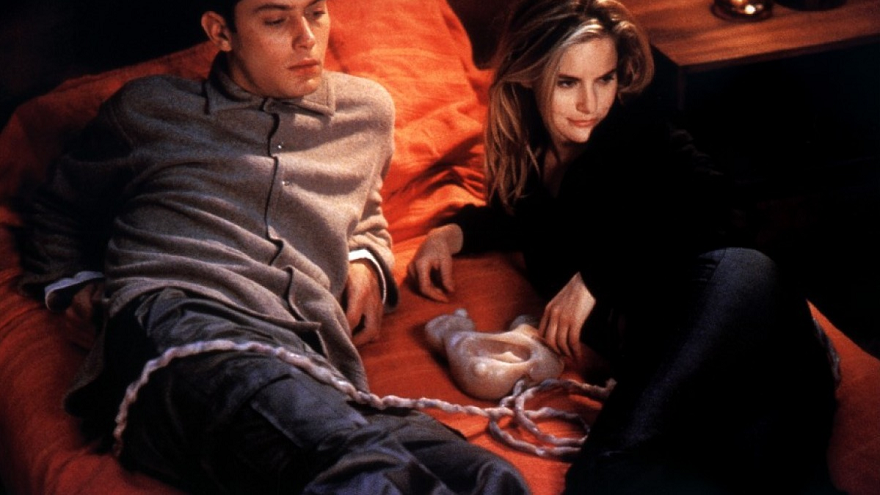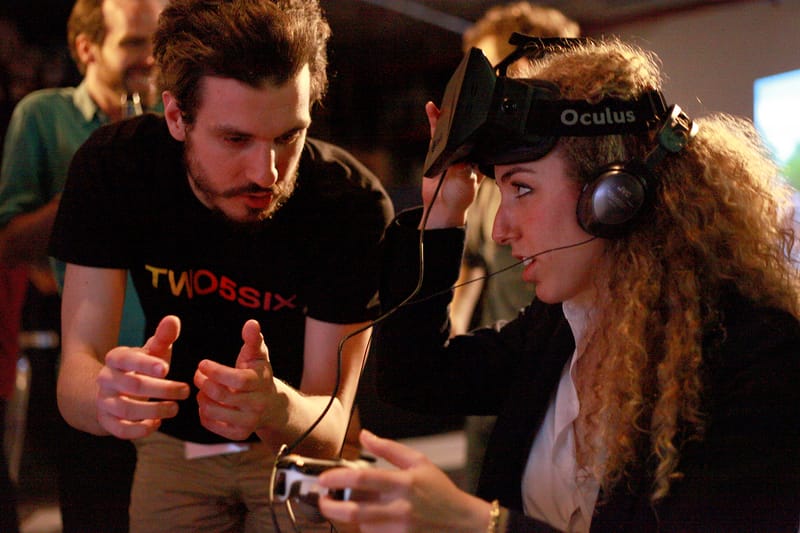This article is part of Film Week, Kill Screen’s week-long meditation on the intersection between film and videogames. Check out the other articles here. And, if you’re in NYC, grab tickets to our Film Fest at Two5Six on Friday, May 15th.
////
A favorite videogame level is like a close lover. Every contour, beat, movement, shape, and obnoxious sound effect is familiar, intimate. You feel at home in this haven of interaction, knowing already what you will do, how you will feel in response to every one of the memorized stimuli being rapidly stuffed down your mind’s gullet, once again. We return to this place over and over because that’s what zen is, digitalized and preserved. So maybe nirvana is “Splash Garden” from Nights, “The Silent Cartographer” from Halo, or “Evolution” from Child of Eden. Maybe Valhalla is X-Men‘s Colossus in the arcade, strolling through a sea of robots, non-stop power-ups. Angel laughs sound like Mario coins.
There’s a darkness in this kind of love, some weird sort of tension in these echoing dreams, and film director David Cronenberg has always been one to play that hollow terror up as the element which draws us into his brand of cinema. After a series of conceptually high-brow but awesomely pulpy sci-fi horror flicks (the dark side of mental evolution in Scanners, the psychosomatic spawning of The Brood, the sexual satire of Shivers) he made a statement with Videodrome that predicted the rise of reality television as it even more insightfully predicted the consequences of holding the mirror up to a reality which had long pretended to be sure rather than tenuous, fragile, easily warped. It was an introduction of a meta-thread to Cronenberg’s oeuvre that would be seen again in his rendition of Naked Lunch and it would serve as a subtle through-line, Cronenberg doing Cronenberg, in all his other fantastic films. But it reached its culmination in 1999 with eXistenZ, Cronenberg’s most criminally slept-on and under-appreciated opus, an out and out masterpiece. About videogames. And sex. And film. And Cronenberg. And everything.

eXistenZ is to Cronenberg as Mirror is to Tarkovsky, 8 ½ is to Fellini, Persona is to Bergman. It is a chillingly incisive self-summation, a piece of art about the artist that is so fully about its subject that it is not just about itself and its author, it is about art, and is so quintessentially about art it is then in extension about art’s subject … which is, like, you know, existence. Cronenberg seems the type of fellow more prone to have his nose in a book then sweating on a game controller, but by tackling the subject of videogames as they were in the midst of becoming more “real,” he stumbled upon his perfect muse. With eXistenZ Cronenberg has a thematic skeleton key, and he sets off in the direction of opening every door ever. The film’s entendres are exponential. Its layers shift and peel back, revealing more layers, and those layers are made of layers. You might say the movie is about a virtual reality game designer (but VR that makes Oculus Rift look like Pong) played by Jennifer Jason Leigh who is being protected, sort of, by Jude Law’s character from a plot against her life in a nebulous, non-descript, but meticulously detailed future. Except that eXistenZ is not about any of that, at all. Those are merely plot points that seem to happen. They are tokens of a narrative, much in the way that a game pretends to tell a story as actually, really, there is only the game.
In games this is showboating. In eXistenZ it is meaning.
One of the film’s shrewdest moves is how it dissociates the viewer from any assumption as to what is supposed to be real. Leigh’s and Law’s characters float through abstracted realist dreamscapes, where everything worth naming is named what it is (a country gas station is titled Country Gas Station) and everything else is all trees and shadows glimpsed by narrow lensing. Drives through blatantly rear-projected countryside take our protagonists to production design destinations, sets on sets about sets about virtual sets about the real world which is, Cronenberg drolls, a set. Multiple insert shots (i.e. a hand gripping the back of a chair, glasses set down with a clink next to a spreading pool of game-pod blood) reinforce just how damn tactile everything is even as it can’t be placed, does not belong to any particular era or person or context—and one begins to wonder if things like that ever really mattered, anyways, if it was always and only ever about the tactility, to be honest. Like many modern videogames, eXistenZ presents us a veneer of reality and then emphasizes that veneer, in a way calling attention to its own artificiality. In games this is showboating. In eXistenZ it is meaning, because its meaning is the meaninglessness of our own lives, and how that meaninglessness becomes its own meaning. These realities, these dreams, are interlaced with each other, which Law’s character remarks on, by way of which he also comments on the film’s grammar, winking at the camera without winking, eyes wide shut. The characters are ghosts in a machine, the machine itself a ghost, the ghost God’s dream, God sitting on a couch playing The Universe #543200016: This Time There’s Lady Gaga, while God himself is just one of many gods who are characters in a Sims-like Godworld game waiting for a reset button to be hit, if only there was anyone or anything real to hit it.

In eXistenZ the game systems are biological organisms, which not only brings some iconically Cronenbergian imagery to a film already stuffed to the gills with Cronenbergian shit, but thematically pays off dividends by illustrating how organisms are just more nodules in a larger system of programming and, oh fuck, humanity, we’re organisms! eXistenZ is running about a hundred applications of this theme simultaneously, mind you, but then watch how every sexual innuendo for game linkage plays out in extended metaphor and implication, like primo Nas rapping, to the point where Willem Dafoe’s gas station attendant (named, of course, Gas) temporarily paralyzes Law with a bio-port implant (in what Cronenberg once referred to as the “gay rape” scene) because the procedure comes with its own epidural, “like giving birth.” Yes, a lot of this dialogue is on-the-nose, like videogames, something the film talks about, which is also like videogames because they often talk about themselves, too, especially when they’re trying to tell you what to do, and—get this—the characters in eXistenZ derive their motivations by trying to figure out what the game wants them to do. Sound anything like any reality you’ve experienced lately? Cronenberg really did his research, though, because the film also contains the charming non-sequiturs that so many games have (at one point a character tells another that they’ll make sure their room has fresh towels, and tells them with such import that you’d swear fresh towels will somehow be the crux of the climax … but then fresh towels are never heard from again) and like games the machinations of the plot become more convoluted and frenetic; the fabrication starts to tear itself apart so that you can see, beneath the rifts, nothing but game, game, Game.
As an aesthetic exercise it is equally singular
These dour epiphanies mount in the film and resonate through its layers into your own presence—you, in your room, watching this movie, you think—like the ultimate existential crisis as a slow crescendo, as a post-modern refrain, legato and full of grace. That might seem an oxymoronic description but understand the paradigm eXistenZ is limning like so many textures plastered onto so many interchangeable shapes; everyone is just ciphers, people with names like Allegra Geller or Gas, and everything is just programming, laws of science and biology and psychology and sex. It is all Game. But it is a game within a game within a game, and these patterns move over and under and across each other, creating something else that’s strangely powerful and beauteous; check the graphics to the title card sequence to see Cronenberg pointing at you, nodding. As every particle folds in or expands out, their own universes, something like a purposeful Fate is born somewhere within the inscrutably complex interplay of endless parallel code, made of symbols that are irreducibly simple yet in their own form dense with power, on or off. As an intellectual exercise eXistenZ is peerless, observant and absurdist, its humor biting and wry, its reflexivity an infinity mirror. As an aesthetic exercise it is equally singular, creating a mood all its own with a unique tone, a shuddering melancholy that laughs at itself as it drifts further and further away from any connection to anything. But there is an inexplicable ache at the heart of eXistenZ. It shouldn’t matter that anyone is hurt or killed or shot with a round of human teeth (just watch the movie) and the film says it sort of doesn’t matter but that it doesn’t is sad. And that sadness is its own beauty and its own meaning. At every point within the Game where self-awareness exists, there lies the portal to sublimity. For the self-aware game character looks at the world and the other characters and the Game and it can feel something. And it can make choices, of compassion and goodness (whatever that is), that would seem to defy its own programming or the futility of its own existence. Or it can just go ahead and empty a clip of molars in a fool’s ass because nothing’s really real, right? Game on.

Free will is an illusion, the film asserts, but to even ask the question of free will is the sound of something like a spirit screaming at the void. eXistenZ is art, and art is its own redemptive act, its own purpose for being, for it is creation. The Keatsian recognition of beauty is truth and truth beauty and that’s all the fuck we need to know is relayed in the context of personal relationships as love, selfless and bending at the edges of our character scripts, and in the context of our self-aware species trying to communicate something to itself, it is art. eXistenZ ends on one hell of a loaded question, a character who has been shot before as another character who is the same character now facing the recurrence of that shooting, doomed to be shot mercilessly, forever, probably … this hapless dude, asking, “Tell me the truth, guys … are we still in the game?” The film doesn’t answer that question because it doesn’t need to. It is not the question, merely one question of legion. Something closer to the right question in this case would be, shit, have we ever NOT been in the Game? The nightmare is suspecting the truth. But the truth is that the Game—for all its senseless dread and violence, for its depth upon depth of shallows, for all its pre-programmed confusion, chaos, and death—the Game, my friends, is beautiful. Because in the seeing of it, the knowing of it, the living of it, in our awareness and propagation of it, proliferating it into other levels of consciousness, art and videogames, favorite levels … we make it sacred. We are playing it again, with every shape and beat and noise, we are building a heaven. We say that it is beautiful and that it should be for all of us, for we are all a part of it. This is our truth, our spelling of existence.
////
This article is part of Film Week, Kill Screen’s week-long meditation on the intersection between film and videogames. Check out the other articles here. And, if you’re in NYC, grab tickets to our Film Fest at Two5Six on Friday, May 15th.





